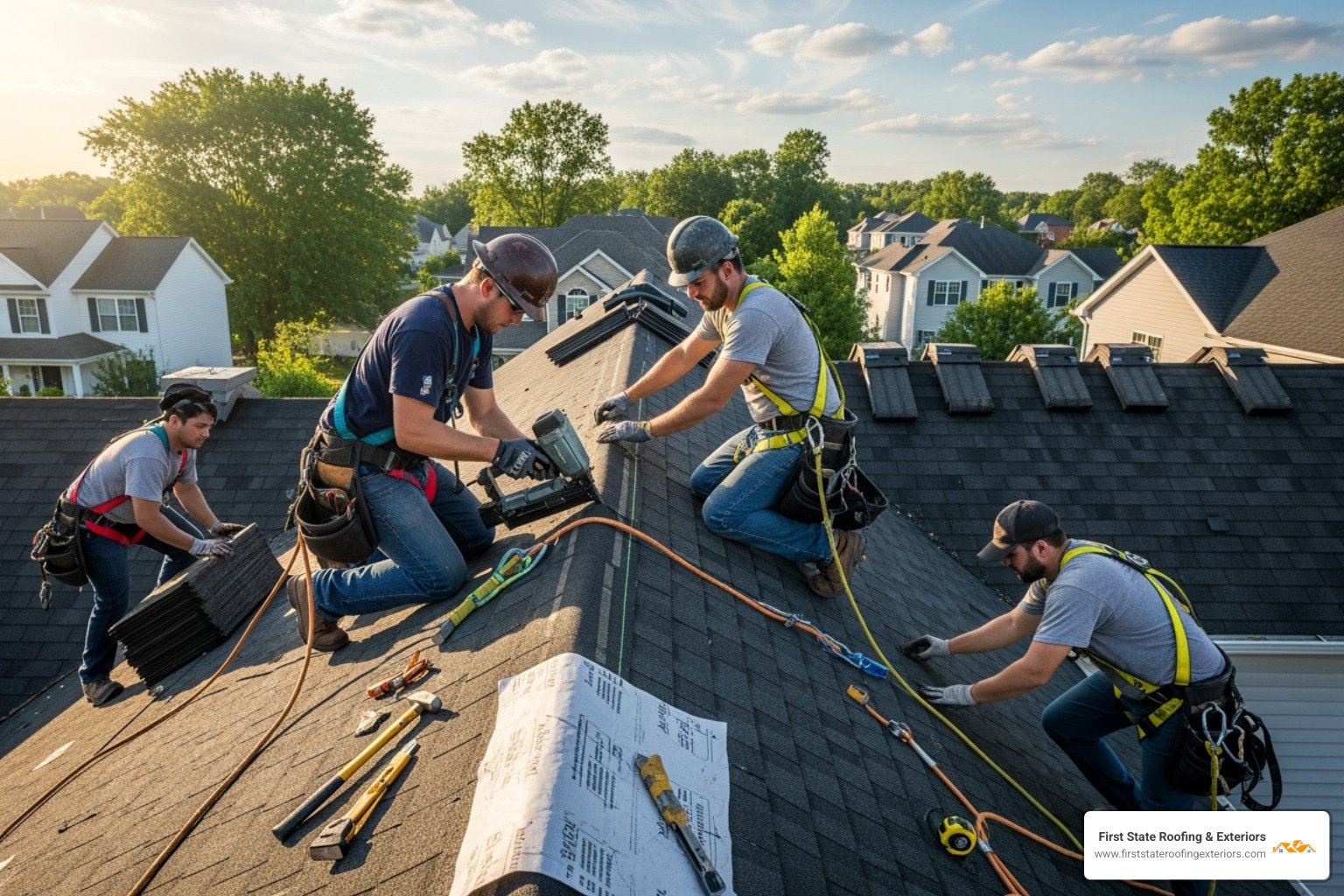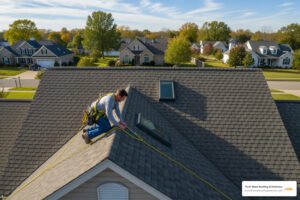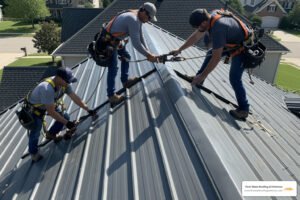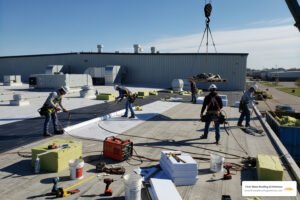Why Understanding Roof Installation Cost Matters Before You Spend
Facing a roof replacement can be daunting, and for most homeowners the final roof installation cost is the top concern. In Delaware, this typically ranges from $7,000 to $32,000, but your invoice can vary significantly. Partnering with a trusted Delaware roofing contractor helps ensure your project becomes a sound investment—not an overpayment—by clarifying options, codes, and true long-term value.
Several key variables influence your total project cost:
- Roofing Materials: Costs can range from $3 per square foot for basic asphalt shingles to over $30 for premium slate.
- Labor: This is a major component, often accounting for 40-60% of the total budget.
- Roof Size & Complexity: A larger, steeper roof with features like dormers and skylights will cost more than a simple, small ranch-style roof.
- Your Location: Labor rates and permit fees vary across Delaware, from Sussex County to the Wilmington area.
The difference between a smart investment and an expensive mistake often comes down to knowledge. This comprehensive guide will break down every cost factor, highlight red flags to avoid, and provide proven strategies to secure high-quality work at a fair price. Whether you’re dealing with unexpected storm damage or planning a necessary upgrade, you’ll gain the confidence to steer your project and make informed decisions about your final bill.
For an expert roof replacement backed by over 20 years of dedicated experience in Delaware, First State Roofing & Exteriors offers transparent pricing and unparalleled workmanship.
I’m Richard McCain, owner of First State Roofing & Exteriors, and I’ve helped thousands of Delaware homeowners make smart roof installation cost decisions over the past two decades. My hands-on experience with everything from basic asphalt shingle replacements to complex commercial projects gives me unique insight into what drives pricing—and where you can save money without cutting corners.
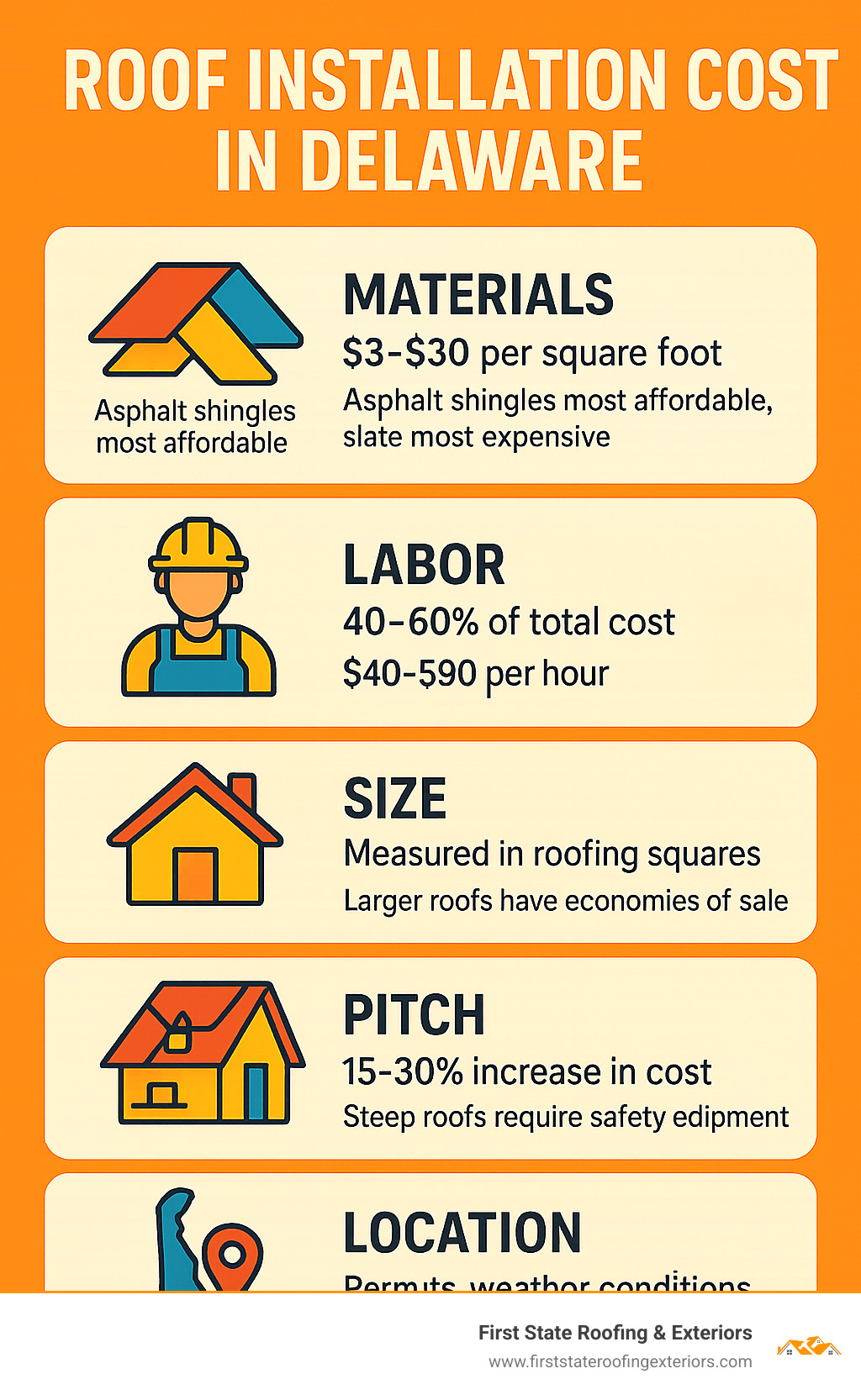
Understanding the Average Roof Installation Cost
Let’s talk numbers. While the national roof installation cost typically falls between $5,000 and $15,000, with a median price around $9,000, these figures are just a starting point. For a standard 2,000-square-foot home with basic asphalt shingles, the national average is about $7,283. However, these averages don’t account for regional differences, especially the unique factors we face here in Delaware.
To understand any roofing estimate, you first need to know how contractors measure and quote jobs. The industry standard is the “roofing square,” which is a 10-by-10-foot area, or 100 square feet. So, when a contractor quotes $350 per square, they mean $3.50 per square foot. This system simplifies calculations for large areas but can be confusing if you’re used to thinking in square feet. A typical 2,000 sq. ft. roof is equivalent to 20 roofing squares.
Here in Delaware, our local roof installation cost is shaped by our environment. We don’t see the extreme pricing of some markets (like Washington state’s $14,000-$26,000 range), but our climate demands specific materials and installation techniques. For instance, homes in our coastal communities like Lewes, Rehoboth, and Bethany Beach are exposed to salt air and higher wind speeds from coastal storms. This often necessitates corrosion-resistant fasteners, specific underlayments, and improved installation methods to meet local building codes, which can add to the cost. Meanwhile, inland homes around Dover or Milford may have different considerations related to wind patterns and local ordinances.
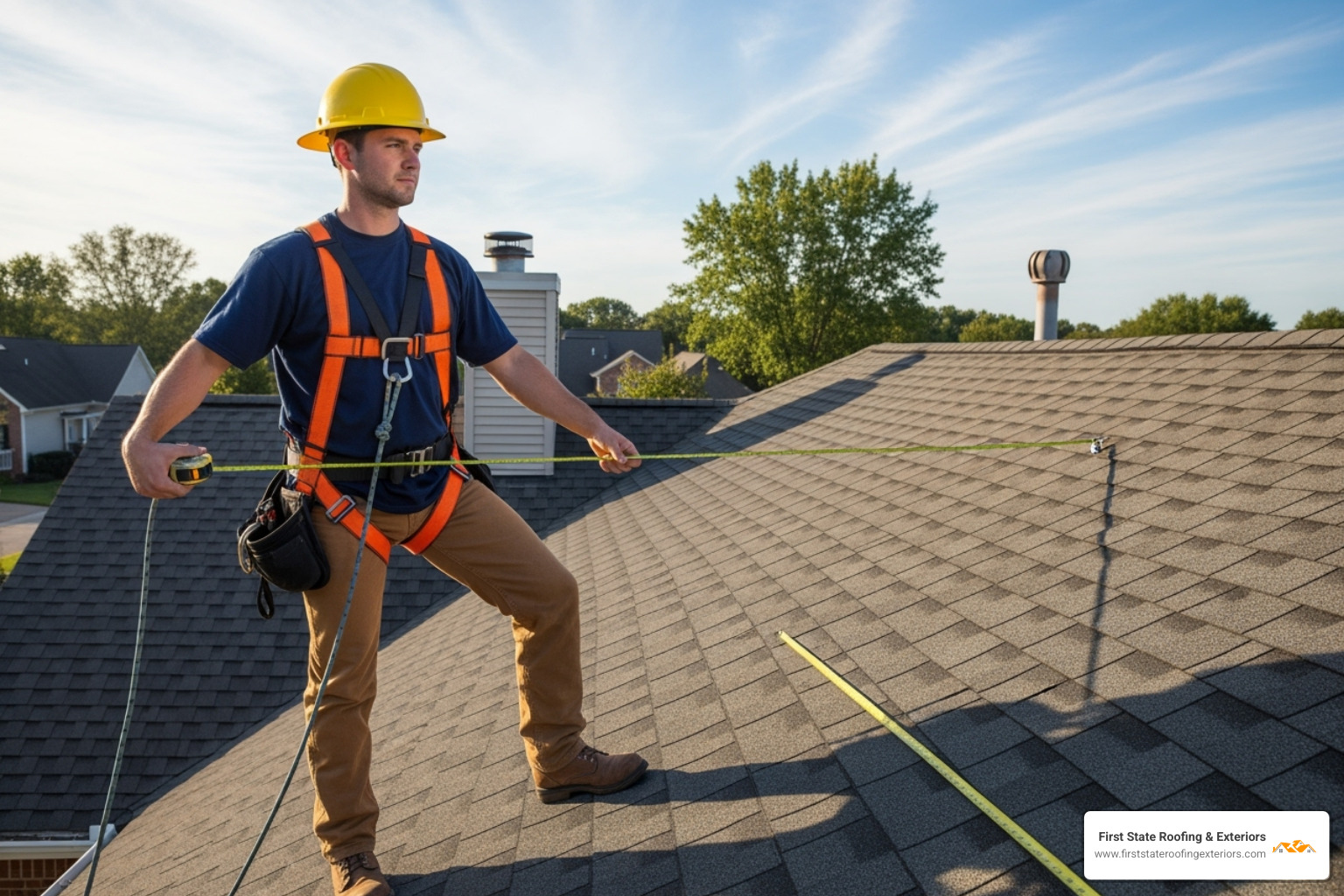
At First State Roofing & Exteriors, we have priced thousands of roofs across Delaware, from the northern towns to the southern beaches. We understand these local nuances and build them into our transparent, honest estimates. If you’re in the Dover area and want pricing that reflects your home’s specific needs, learn more about our roofing services in Dover.
How Roof Size Impacts Your Total Bill
Size is undeniably one of the most significant factors determining your final bill. A larger roof requires more materials and more labor hours, which directly translates to a higher cost. However, calculating your roof’s true size isn’t as simple as using your home’s square footage. The actual roof area includes its pitch (or steepness) and any overhangs.
A home with a 1,000-square-foot ground footprint could easily have 1,200 square feet or more of roof surface area, especially if it has a steep pitch. For example, a standard 4/12 pitch roof has about 5% more surface area than its footprint, while a steep 12/12 pitch has over 40% more surface area. This additional area must be factored into material and labor calculations.
Let’s look at some real-world cost estimates for different roof sizes using standard architectural shingles:
- 1,500 square foot roof: On a typical ranch home, this might cost between $6,500 and $9,000. This size is common for smaller single-story homes in communities across Delaware.
- 2,000 square foot roof: As the most common size we encounter, the cost generally ranges from $8,000 to $12,000. The variation depends heavily on complexity and material choice.
- 3,000 square foot roof: For larger homes, the cost can jump significantly, often landing between $12,000 and $20,000 for asphalt shingles. If you opt for premium materials like metal or slate on a roof this size, the cost can exceed $35,000.
The underlying principle is simple, but the details are what matter. A complex Victorian-style roof with multiple dormers, valleys, and a steep pitch will always cost more per square foot than a simple gable roof on a ranch house, even if their total surface areas are identical. This is because complex roofs require more intricate labor, specialized cuts, additional safety precautions, and more flashing materials. This direct correlation between project scale and total investment is a consistent finding in housing studies, such as those from Harvard’s Joint Center for Housing Studies, which show that larger, more complex projects naturally have higher material and labor demands.
Key Factors That Drive Up Your Final Price
Every roofing project is unique, and several key variables can significantly influence your final bill. Understanding these factors is essential for accurately interpreting your roof installation cost and ensuring you receive fair value for your investment. Beyond the overall size, the material you choose, the labor involved, the complexity of your roof’s design, and potential hidden issues all play a critical role.
The Price of Different Roofing Materials
The type of roofing material you select is the single biggest driver of your new roof’s cost. Materials vary widely in price, durability, weight, and aesthetic appeal. A budget-friendly option might save you money upfront but could require replacement sooner, while a higher initial investment in a premium material could provide decades of worry-free performance.
Here’s a detailed comparison of common roofing materials used in Delaware:
| Material | Average Cost per Sq. Ft. (Installed) | Lifespan (Years) | Key Benefits |
|---|---|---|---|
| Asphalt Shingles | $4.50 – $7.50 | 20-30 | Most affordable, wide variety of colors, easy to install and repair. |
| Architectural Shingles | $5.50 – $9.00 | 30-50 | Improved durability, dimensional look, better wind resistance. |
| Metal (Standing Seam) | $10.00 – $20.00 | 50-70+ | Extremely durable, energy-efficient, lightweight, modern aesthetic. |
| Clay/Concrete Tile | $10.00 – $25.00 | 50-100 | Highly durable, fire-resistant, classic aesthetic, excellent for coastal areas. |
| Slate | $15.00 – $35.00+ | 100+ | Best longevity, natural beauty, fireproof, ultimate luxury option. |
Asphalt Shingles: As the most popular roofing material in the U.S., asphalt shingle systems offer a strong balance of performance and affordability. Architectural shingles, a premium type of asphalt shingle, provide a more robust, multi-dimensional look and typically come with longer warranties.
Metal Roofing: Once reserved for commercial buildings, metal roofing is rapidly gaining popularity for residential homes. While the upfront cost is higher, its exceptional lifespan, energy efficiency (by reflecting solar heat), and superior resistance to wind and fire make it a wise long-term investment.
Labor’s Contribution to the Total Roof Installation Cost
Labor is the second-largest component of your bill, typically accounting for 40% to 60% of the total roof installation cost. In Delaware, hourly rates for skilled roofers can range from $40 to $90 per hour, depending on experience and the complexity of the job. This cost covers not just the installation crew’s wages but also essential overhead like liability insurance, workers’ compensation, and professional certifications. While it might be tempting to choose a contractor with the lowest labor rate, this can be a red flag. Experienced, reputable crews command higher rates because they deliver higher-quality work, adhere to safety standards, and ensure the job is done right the first time, which is validated by data on construction labor from the U.S. Bureau of Labor Statistics.
How Roof Pitch, Complexity, and Accessibility Affect Price
The design of your roof has a direct impact on labor costs.
- Pitch: A roof’s pitch is its steepness. A low-slope roof (below a 4/12 pitch) is easy to walk on and work from. However, a steep-slope roof (anything above 6/12) requires specialized safety equipment like harnesses and roof jacks. Work proceeds more slowly and carefully, increasing labor hours and costs by 15% to 30% or more.
- Complexity: A simple gable roof is far less expensive to replace than a roof with multiple dormers, valleys, hips, skylights, or chimneys. Each of these features requires precise cuts, extra materials, and detailed flashing work to prevent leaks, adding significant time and skill to the project.
- Accessibility: A single-story home with ample space around it for ladders and material staging is easier to work on than a three-story home on a tight lot with extensive landscaping to protect. Difficult access can increase labor time and, consequently, the price.
Hidden Costs: From Tear-Off to Permits
A professional estimate should be comprehensive, but sometimes unforeseen issues arise once the old roof is removed. It’s wise to budget for potential hidden costs:
- Tear-Off and Disposal: Removing the old roofing materials typically costs $1 to $5 per square foot. This fee covers the labor to strip the roof and the fees for disposing of the debris legally.
- Decking/Sheathing Repair: The wood decking underneath your shingles is the foundation of your roof. If the old roof had leaks, some of this decking may be rotten, soft, or delaminated. Replacing damaged sheets of plywood or OSB is a common additional cost, often running $100 to $150 or more per sheet.
- Underlayment and Ice/Water Shield: Modern building codes require a water-resistant underlayment. Upgrading from standard felt to a high-performance synthetic underlayment can add cost but provides superior protection. An ice and water shield is critical in valleys and along eaves to prevent damage from ice dams, a necessary precaution in Delaware’s climate.
- Permits and Inspections: Most municipalities in Delaware require a permit for a roof replacement. The cost of the permit and any required inspections can range from $150 to $500 and will be included in your contractor’s estimate.
First State Roofing & Exteriors gives free estimates. Call (302) 222-4065 for a free inspection.
